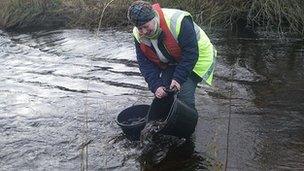River Rede in Northumberland sees return of endangered pearl mussels
- Published

Pearl mussels have not been seen in the River Rede for 50 years
Thousands of fish have been released into a Northumberland river in an effort to re-establish a rare species of freshwater mussel.
Environment Agency officers released 11,000 sea trout into the River Rede, some of which were carrying microscopic pearl mussel larvae.
The endangered molluscs' unusual breeding process requires fertilised eggs to "latch" on to fish to develop.
Pearl mussels have not been seen in the river for 50 years.
The breeding programme mirrors what should happen in the wild, using the trout as hosts for the mussels.
The trout were bred at the Environment Agency's Kielder Hatchery, where they were deliberately "infected" with pearl mussel larvae from a captive pearl mussel population in the hatchery's artificial stream.
About 20% of the fish are expected to be carrying the larvae.
Ice Age
Agency ecologist Anne Lewis said: "Mussels are not breeding in the wild and will become extinct in Northumberland if we cannot find ways to support the species.
"In the past, pollution, dredging and poaching have all taken their toll on the population nationally but our rivers are now the healthiest they have been for 20 years."
Pearl mussels has been in British rivers since the end of the Ice Age and they were recorded at the time of the Roman invasion.
Ms Lewis added: "From here it's a slow growing process for the mussels. They'll be with the sea trout until spring next year, by that time they will just visible to the naked eye.
"They then drop off the fish and continue grow in the river bed for about 20 years before they are ready to breed."
Once established in the region's rivers, the young pearl mussels will grow to about 130mm (5ins) and live for about 100 years.
- Published9 September 2010
- Published24 May 2010